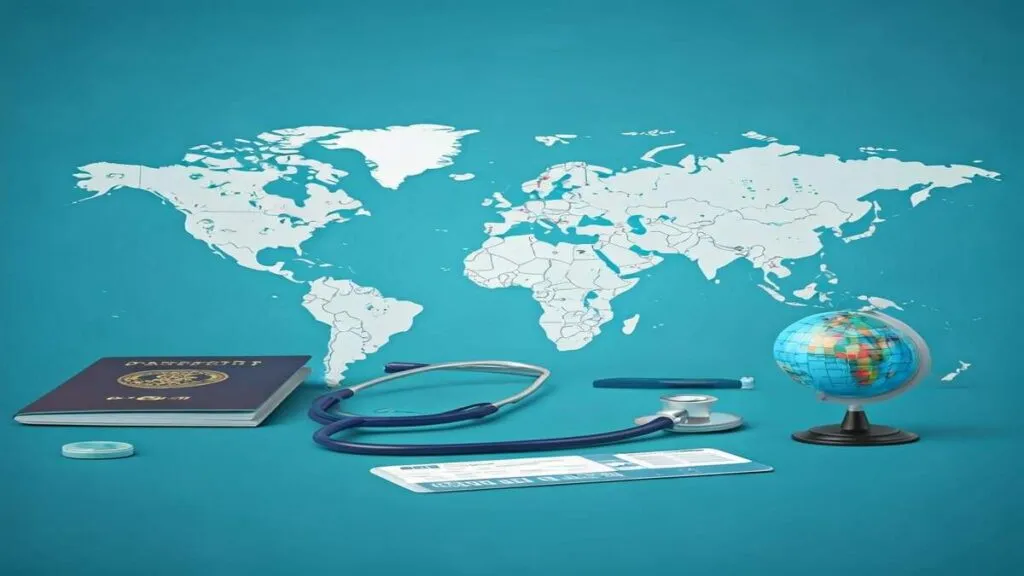
Are you considering traveling overseas for medical care? You’re not alone. Each year, millions of people seek affordable, high-quality treatment in countries known for medical expertise. Whether it’s dental work in Turkey, cosmetic surgery in Thailand, or cardiac surgery in India, medical travel also known as medical tourism—has become a global trend. With the right planning, a medical trip abroad can provide affordable, world-class care with better outcomes.
But a successful medical trip involves more than just booking a flight and choosing a clinic. You need to plan wisely, stay informed, and prioritize your safety. This guide covers all the essential steps to ensure your medical trip abroad is safe, hassle-free, and effective—from in-depth research and travel tips to choosing trusted providers and managing care after treatment.
Contents
What Is Medical Tourism?
Medical tourism refers to the act of traveling to another country to receive medical treatment, often at a lower cost or with faster service than in your home country. Popular procedures include:
- Elective surgeries (cosmetic, bariatric, orthopedic)
- Dental treatments (implants, veneers, surgery)
- Fertility treatments (IVF, egg freezing)
- Specialized surgeries (cardiac, cancer, neurological)
- Health check-ups or wellness retreats
People choose medical tourism for a variety of reasons, including:
- High cost of treatment at home
- Long wait times
- Access to advanced or alternative treatments
- Privacy and discretion
- Opportunity to recover in a vacation-like setting
Why 2025 Is the Right Time to Consider Medical Travel
The post-pandemic world has reshaped how we approach global healthcare. In 2025:
- Telehealth and digital health tools make it easier to consult with foreign doctors before you travel.
- Improved travel infrastructure in emerging health destinations offers greater safety and comfort.
- Medical accreditations are now more standardized, helping you verify quality care globally.
From cost savings to high-tech hospitals, medical travel is more accessible and safer than ever—if planned well. These trends make it the ideal time to consider a medical trip abroad, especially for procedures that are expensive or delayed at home.
Step-by-Step: How to Plan a Safe and Successful Medical Trip Abroad
Let’s break it down into manageable steps to help you plan your journey with confidence.
1. Define Your Medical Needs
Before planning anything, get a clear diagnosis and recommendation from your primary healthcare provider at home. This ensures:
- You actually need the treatment.
- You understand the risks.
- You can compare options fairly.
Pro Tip: Ask your doctor if they have any insights or contacts with clinics abroad. Referrals can add a layer of safety.
2. Research Countries & Clinics Thoroughly
Not every country or clinic is created equal. Doing this early helps you compare quality and plan your medical trip abroad with fewer surprises.
✔️ Country Safety & Healthcare Infrastructure
Look for countries known for medical tourism, such as:
- Thailand: Cosmetic surgery, orthopedics
- India: Cardiology, oncology, transplants
- Mexico: Dental care, bariatric surgery
- Turkey: Hair transplants, eye surgery
- Costa Rica: Dental and wellness care
Check for:
- Political stability
- Travel advisories
- Visa requirements
- Local laws and regulations
✔️ Accredited Hospitals & Clinics
Seek facilities with international accreditations, such as:
- JCI (Joint Commission International)
- ISO certifications
- TEMOS or NABH (in India)
Read patient reviews, check doctor qualifications, and confirm the clinic’s experience in your specific procedure.
3. Get Virtual Consultations
Before committing, schedule video or phone consultations with the medical provider. This helps you:
- Ask important questions about the procedure
- Understand the timeline and recovery
- Get clarity on cost and what’s included
Questions to ask:
- What are the total costs, including hidden fees?
- What’s the provider’s experience with foreign patients?
- What’s the post-treatment follow-up plan?
- Is there a translator available if needed?
4. Understand the Cost Breakdown
Medical travel can be more affordable—but clarity is key. Ask for a detailed price quote that includes:
- Procedure fees
- Anesthesia and operating room costs
- Consultation and lab tests
- Hospital stay
- Medications
- Travel, accommodation, and meals
Tip: Consider packages that include airport pick-up, hotel, and local support—it may save money and reduce stress.
5. Plan Travel and Accommodation Smartly
Travel planning is a big part of medical tourism. Here’s what to consider:
- Book refundable tickets in case of schedule changes.
- Choose accommodation near the clinic, ideally with wheelchair access or in-room care options.
- Plan for at least a few extra days post-treatment for observation or follow-up.
- Use medical travel agencies only if they are reputable and transparent.
6. Prepare Your Documents
Carry copies (and digital backups) of all essential documents:
- Passport and visa
- Medical records and test results
- Insurance papers (if applicable)
- Doctor’s prescription
- Emergency contacts
- Local contact numbers (clinic, hotel, embassy)
Being organized with your paperwork is key to a smooth medical trip abroad, especially during emergencies or check-ins.
7. Consider Travel Health Insurance
Not all travel insurance covers medical procedures abroad. You may need:
- Medical travel insurance (covers complications, cancellations)
- Medical malpractice insurance (in case of negligence)
Be sure to carefully review the details and confirm your coverage for:
- Emergency evacuation
- Post-surgical complications
- Trip delays or procedure cancellations
8. Take a Travel Companion (If Possible)
A trusted friend or family member can:
- Provide emotional and physical support
- Help with transportation or language barriers
- Communicate with medical staff on your behalf
Many clinics even recommend this, especially for major surgeries.
9. Know What to Expect During Recovery
Post-treatment recovery is crucial for your safety and results. Make sure:
- Your accommodation allows adequate rest
- You can attend post-op visits without hassle
- You don’t schedule any tourism or flights too soon
Follow all doctor’s instructions carefully and keep in touch after returning home.
10. Arrange Follow-Up Care at Home
After your trip, your local doctor should continue your care. Provide them with:
- Procedure summaries
- Medication details
- Discharge papers
- Lab reports
This ensures continuity of care and reduces long-term risks.
Each step you take toward a successful medical trip abroad helps protect your health, your finances, and your peace of mind.
Packing Essentials for Medical Travel
Here’s a quick checklist of what to pack:
- Copies of medical records
- Prescription meds in original bottles
- Comfortable clothes, slippers, and a robe
- Travel pillow and neck support
- Basic hygiene items (unscented if possible)
- Notepad and pen for notes/questions
- Power bank and charger adapters
- Snacks and water bottle (especially if on restricted diet)
A well-packed bag reduces stress and helps you focus fully on your recovery during your medical trip abroad.
Bonus Tips for a Successful Trip
- Learn a few local phrases or download a translation app.
- Avoid street food or unfiltered water before your procedure.
- Notify your embassy about your travel plans for safety.
- Respect local culture and hospital etiquette.
What to Avoid
- Clinics that refuse to answer questions
- Vague pricing or “limited-time discounts”
- Unlicensed agents or middlemen
- Countries under current travel warnings
- Over-promising results (especially for cosmetic surgery)
Top Medical Tourism Destinations in 2025

We’ve covered the top global destinations for medical travelers—including their specialties, costs, and pros—in a separate detailed guide. 👉 Explore the Top Medical Tourism Destinations in 2025 here
❓ Frequently Asked Questions (FAQs)
1. Is traveling abroad for medical treatment safe?
Yes, medical travel is safe when well-planned. Choose accredited hospitals, experienced doctors, and follow proper post-treatment care. Always do your research and avoid unverified clinics.
2. What are the leading countries for medical tourism in 2025?
Top destinations include Thailand, India, Mexico, Turkey, and Costa Rica, depending on your procedure. Each offers specialized care, international clinics, and affordability.
3. How much money can I save with a medical trip abroad?
You could save between 30–70% compared to treatment costs in the U.S. or Europe, depending on the country and procedure. Always compare total costs, including travel.
4. Does insurance cover treatment abroad?
Some international or travel insurance plans may cover complications or emergencies abroad, but most local insurance does not cover elective procedures overseas. Read your policy carefully.
5. Is it possible to receive follow-up care once I’m back home?
Yes, but it’s important to coordinate with your local healthcare provider before you travel to ensure smooth follow-up care. Yes, but you should arrange it ahead of time with your local doctor. Bring medical records, discharge papers, and treatment summaries for smooth continuity of care.
6. How do I verify if a hospital abroad is safe and trustworthy?
Check if the facility is accredited by a recognized body like JCI, which evaluates hospitals globally for safety and quality.
Final Thoughts: Your Health Is Worth the Effort
Medical travel is more than just a way to save money—it’s a serious journey with lifelong health consequences. With the right planning, clear expectations, and safe practices, your medical trip abroad can be a life-enhancing experience, not just a cost-saving one.
Share Your Experience; Have you traveled for medical treatment before? Are you planning one soon? Share your story or ask questions in the comments section below. Your experience might help someone else!
For more helpful guides on planning a medical trip abroad, explore our full medical travel section here.
Disclaimer: This guide is for educational purposes only. Always consult with your doctor before making medical travel decisions. Verify that your chosen hospital or clinic is accredited and safe.
Founder of My Health Tech Talk. He is a health informatics professional, researcher, and graduate assistant with a passion for digital health and innovation, medical tourism and health tips. Learn more about author and his mission on the About Us page


